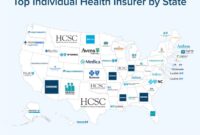Health insurance marketplace sets the stage for this enthralling narrative, offering readers a glimpse into a story that is rich in detail with a brimming originality from the outset.
The Health Insurance Marketplace is a crucial platform that provides individuals with access to various health insurance plans. This comprehensive guide delves into the intricacies of this marketplace, helping you make informed decisions about your healthcare coverage.
Overview of Health Insurance Marketplace
The Health Insurance Marketplace is a platform where individuals can compare, choose, and purchase health insurance plans. It was established as part of the Affordable Care Act to provide a centralized location for people to find quality, affordable health coverage.
The purpose of the Health Insurance Marketplace is to make it easier for individuals to find a health insurance plan that meets their needs and budget. By offering a range of options from different insurance companies, the marketplace allows consumers to make informed decisions about their healthcare coverage.
One of the key benefits of using the Health Insurance Marketplace is the potential to qualify for premium tax credits and other cost-saving subsidies. These financial assistance programs can help lower the monthly premiums for eligible individuals, making health insurance more affordable.
There are different types of health insurance plans available through the Health Insurance Marketplace, including:
– Health Maintenance Organization (HMO) plans
– Preferred Provider Organization (PPO) plans
– Exclusive Provider Organization (EPO) plans
– Point of Service (POS) plans
Individuals can access the Health Insurance Marketplace through the official website, where they can create an account, provide information about their household and income, and browse the available health insurance plans. They can also seek assistance from certified navigators or brokers to help them understand their options and complete the enrollment process.
Enrollment Process: Health Insurance Marketplace

When enrolling in a health insurance plan through the marketplace, there are specific steps that individuals need to follow to ensure they have coverage. Understanding the enrollment process is crucial for obtaining the right health insurance plan that meets your needs.
Steps for Enrolling in a Health Insurance Plan
- Create an account on the Health Insurance Marketplace website.
- Fill out the application with your personal information, including household size and income.
- Compare the different health insurance plans available to you based on your location and needs.
- Select the plan that best fits your requirements and budget.
- Submit your application and wait for approval.
- Make the first premium payment to activate your health insurance coverage.
Eligibility Requirements for Enrolling
- Must be a U.S. citizen or legal resident
- Cannot be currently incarcerated
- Cannot be enrolled in Medicare
- Must meet income requirements
Open Enrollment Period and Special Enrollment Periods
- The open enrollment period is typically from November 1st to December 15th each year, during which individuals can enroll in a health insurance plan or make changes to their existing plan.
- Special enrollment periods are available for individuals who experience qualifying life events, such as losing other health coverage, getting married, having a baby, or moving to a new area.
Applying for Financial Assistance
- When enrolling in a health insurance plan through the marketplace, individuals can apply for financial assistance to help lower their monthly premiums and out-of-pocket costs.
- Financial assistance is based on income and household size, and individuals can apply for subsidies that can significantly reduce the cost of health insurance.
- To apply for financial assistance, individuals need to provide information about their income, household size, and any other relevant details requested on the application.
Coverage Options and Benefits

When exploring the Health Insurance Marketplace, individuals will encounter various coverage options tailored to their needs and preferences. Understanding the types of coverage available and the benefits they offer is crucial in making informed decisions regarding health insurance.
Types of Coverage Options, Health insurance marketplace
- Health Maintenance Organization (HMO): These plans require individuals to choose a primary care physician and obtain referrals for specialists.
- Preferred Provider Organization (PPO): PPO plans offer more flexibility in choosing healthcare providers and do not require referrals for specialists.
- Exclusive Provider Organization (EPO): EPO plans provide coverage only for services rendered by in-network providers, except in emergencies.
- Point of Service (POS): POS plans combine features of HMO and PPO plans, allowing individuals to seek care from both in-network and out-of-network providers.
Essential Health Benefits
- Preventive services, including vaccinations and screenings
- Emergency services
- Prescription drugs
- Mental health and substance abuse treatment
- Maternity and newborn care
- Hospitalization
- Rehabilitative and habilitative services
Cost-sharing Structures and Out-of-pocket Expenses
- Insurance premiums: Monthly payments to maintain coverage
- Deductibles: Amount individuals must pay out-of-pocket before insurance coverage kicks in
- Co-payments: Fixed amounts paid for services, such as doctor visits or prescriptions
- Co-insurance: The percentage of costs individuals must pay, even after meeting the deductible
- Out-of-pocket maximum: The limit on how much individuals have to pay for covered services in a plan year
Role of Subsidies and Tax Credits
Subsidies and tax credits play a crucial role in making health insurance coverage more affordable for individuals and families. These financial assistance programs are designed to lower monthly premiums and out-of-pocket costs, ensuring that healthcare remains accessible to those who need it most.
Maintaining and Using Health Insurance

After enrolling in a health insurance plan, individuals have certain responsibilities to ensure they can maximize the benefits of their coverage and navigate the healthcare system effectively.
Responsibilities After Enrolling
- Pay your premiums on time to avoid any lapses in coverage.
- Update your information if there are any changes in your personal details or household income.
- Understand your coverage, including what services are included and any limitations or restrictions.
- Keep track of your medical expenses and claims to ensure accuracy.
Maximizing Benefits of Health Insurance Coverage
- Schedule preventive care visits to stay on top of your health and catch any potential issues early.
- Use in-network providers to avoid out-of-network costs.
- Take advantage of any wellness programs or discounts offered by your insurance provider.
- Explore telehealth options for convenient access to healthcare services.
Renewing or Changing Plans
- Review your current plan’s coverage and costs before the open enrollment period.
- Compare different plans available in the marketplace to see if there are better options for your needs.
- Make changes to your plan during the open enrollment period if necessary.
- Consider factors like premiums, deductibles, and provider networks when selecting a new plan.
Navigating the Healthcare System
- Understand how to use your insurance card and what information it contains.
- Find in-network providers for your healthcare needs to minimize out-of-pocket costs.
- Keep records of your medical history, prescriptions, and treatments for easy reference.
- Reach out to your insurance provider for any questions or assistance with claims or coverage.
In conclusion, the Health Insurance Marketplace is a valuable resource for securing quality healthcare coverage. By understanding the enrollment process, coverage options, and how to effectively use your insurance, you can navigate the complex healthcare landscape with confidence.
When looking for the best individual health insurance for 2024, it’s essential to consider coverage options and affordability. You can explore different plans and prices on Best individual health insurance 2024 to find the most suitable one for your needs.
Freelancers often face unique challenges when it comes to health insurance. Understanding your options and finding a plan that fits your lifestyle is crucial. Check out Health insurance for freelancers to explore tailored solutions for independent workers.
Comparing individual health insurance plans can help you make an informed decision about your coverage. Visit Compare individual health insurance to compare benefits, costs, and providers to find the best fit for your healthcare needs.



